Author Perspectives on Open Access: Fostering community and equitable knowledge dissemination

With our commitment to embrace “Community over Commercialization”, we engaged in a conversation with Hannah Park, a distinguished researcher and a published author with an extensive experience in the healthcare domain. Hannah’s journey in the world of academia and healthcare, coupled with her keen interest in open access, positions her as a unique and insightful voice in our discussion.
It is essential to pause and listen to the voices of those directly impacted by this transformative shift in knowledge dissemination. Authors, the very architects of research and knowledge creation, have a unique vantage point. Their perspectives shed light on the challenges, opportunities, and the dynamic interplay between open access and scholarly communities. Author perspectives are an integral part of the open access conversation. They offer a window into the real-world implications of open access initiatives and illuminate the path forward in making scholarly communication more equitable, accessible, and collaborative.
Interview With Hannah Park
Q1. As we come together to celebrate Open Access Week 2023 from October 23 to 29, we’re excited to hear your thoughts on the importance of open access. So, how would you define open access in the context of scholarly communication and research dissemination?
“I believe that open access has accelerated research dissemination. The fact that you can access many interesting research results for free is very appealing, and I see it as an expansion of dissemination, not only for researchers but also for the general public. However, there may still be some room for evaluation when it comes to the communication aspect.”
Open Access, as Hannah Park defines it, represents a paradigm shift in scholarly communication and research dissemination. She emphasizes that it has not only accelerated research dissemination but has also made it widely accessible. It has democratized the pursuit of knowledge, allowing not just researchers but also the general public to benefit from the latest research findings. However, she notes that there may still be room for improvement, especially in terms of evaluating the quality of research in an open access context.
Q2. In your opinion, what role does open access play in ensuring equitable access to knowledge and in addressing issues related to accessibility and affordability of academic content?
“I believe that open access is expanding research dissemination. In the past, to see desired research results, I had to pay or subscribe, so I only checked the results I needed. However, with the increasing number of open access journals, I am now studying more research articles. In fact, unless you are a researcher, who would pay to read research papers? I think open access has made it easier for not only researchers but also the general public to access research results. Furthermore, by providing open access to knowledge, it helps address information inequality. However, I also consider that the cost associated with publishing research papers in these open access journals, which is often borne by individual researchers, is another issue.”
Q3. As a researcher from the field of healthcare, how have you personally benefited from open access publications?
“As an individual researcher, I was able to access the research papers I needed in my field of study for free. I consider this a significant advantage.”
From a researcher’s perspective, Hannah has personally reaped the benefits of open access publications. This accessibility has certainly empowered her research journey and, by extension, her contributions to the healthcare field.
Q4. Have you encountered any specific challenges related to open access publishing in the field of healthcare and nursing? How can the community address these challenges and build on successes?
“I did not face any challenges related to open access journals. However, some people tend to believe that open access publishing tends to be faster and more accessible compared to traditional methods. Depending on the situation, such as in cases of professor appointments, is that the evaluation of my papers might be adversely affected.”
Such misconceptions may lead to biases in the evaluation of research, potentially impacting academic careers. The community, she suggests, should address these misconceptions and establish criteria for evaluating open access publications.
Q5. The theme “Community over Commercialization” is central to Open Access Week this year. What does this phrase mean to you in the context of scholarly publishing?
“This phrase appears to be a thoughtful reflection on addressing the issues associated with open access. While open access offers many advantages, such as reduced costs, global collaboration, and public engagement, it often places a financial burden on researchers to publish their work. This can sometimes be exploited, especially for researchers who need publications for their academic careers. It also raises concerns about journals using open access primarily as a means to generate revenue. I think this phrase want to highlights a dilemma about whether the emphasis on open access should be commercialization or fostering a network of collaboration.”
The response highlights concerns that some journals might exploit open access primarily as a revenue-generation tool. The theme is interpreted as emphasizing a dilemma within the context of open access, whether to prioritize commercialization or the development of a collaborative network. It implies that the theme encourages a balance between the benefits of open access and the potential pitfalls related to its commercialization.
Q6. Authors and researchers often have to pay Article Processing Charges (APC) in open access publishing. Could you share your perspective regarding these costs and their impact on scholars? Do you think it affects equitable publishing?
“I, too, as an individual author, find it very regrettable that authors have to pay APCs (Article Processing Charges). The price of APCs is very expensive, ranging from 300 to 500 dollars. There have been times when I wanted to submit my paper to an open access journal, but due to financial issues, I couldn’t. I have a positive view of open access from the perspective of sharing high-quality research results to all over the people. However, I believe that alternative solutions are needed rather than placing this cost burden on individual authors.”
One of the challenges that Hannah and many other authors face is the payment of APCs. These fees, often borne by individual authors, can be a significant obstacle. As an author herself, Hannah finds it regrettable that this burden falls on researchers. She suggests that alternative solutions need to be explored to make open access more accessible.
Q7. In your experience, how has the emphasis on community-driven Open Access impacted the quality and impact of research outputs?
“As I understand it, ‘Community-driven Open Access’ refers to various communities, such as academic researchers, institutions, advocacy groups, taking an active role in making research results openly accessible. Such activities alleviate concerns regarding the cost of submitting to open-access journals for individual authors. It also enables more people to access research results. Furthermore, if clear criteria for support are established, it can assist in improving and managing quality.”
Q8. What do you believe is the role of academic institutions and funding bodies in supporting and promoting open access initiatives?
“I believe that academic institutions and funding bodies play a crucial role in supporting and promoting open access initiatives. Firstly, they can provide support for researchers who wish to publish in open access journals. This financial assistance will enable more researchers to publish in open access journals. Additionally, by actively proposing collaborative projects, they can foster collaboration across various academic fields. In providing such support, setting strict criteria can also contribute to improving and managing the quality of papers.”
Hannah Park’s viewpoint underscores the vital role that academic institutions and funding bodies can play in the growth and success of open access. By financially supporting researchers and encouraging collaboration, they can make open access a more inclusive and quality-driven platform. Hannah’s insights highlight the potential for these organizations to shape the future of scholarly communication in a positive and collaborative way.
Q9. What initiatives or strategies do you believe are necessary to encourage more authors, especially those from underrepresented or resource-constrained regions, to embrace open access publishing?
“First and foremost, I believe that promoting open access should be a priority. Authors from underrepresented or resource-constrained regions may not be well-informed about open access. Therefore, it is crucial to first establish awareness and a positive perception of what open access is and why it is beneficial. Subsequently, through active support in these areas, we can encourage authors from minority or resource-limited regions to embrace open access publishing.”
Hannah Park’s insights provide a clear roadmap for promoting open access among authors facing resource constraints. By first addressing the lack of awareness and misconceptions surrounding open access, we can lay the groundwork for a more inclusive scholarly landscape. Additionally, providing active support and resources to authors in underrepresented regions is essential for breaking down barriers and ensuring that a diverse range of voices is heard in the academic world. Open Access Week, with its focus on “Community over Commercialization,” aligns perfectly with the notion of creating a more inclusive and accessible scholarly community.
Q10. In light of the changing landscape of scholarly communication, do you foresee any future trends or developments in open access that might further support the goals of equitable knowledge dissemination and community engagement?
“There are indeed various opinions about open access, both positive and negative. Personally, I view open access positively in terms of enhancing research results dissemination and accessibility. However, I do share concerns about the potential increase in the burden on individual researchers and the potential for misuse.
Nonetheless, open access is already a significant and unstoppable trend. Therefore, I believe it’s time to consider how we can guide open access in a more positive direction. This could involve implementing rigorous paper evaluation criteria, promoting peer review, fostering interdisciplinary collaboration, and exploring various approaches to encourage the participation of authors from marginalized regions.
In this rapidly evolving landscape, it’s crucial to strike a balance that maximizes the benefits of open access while addressing its challenges.”
This author perspective sheds light on the fact that the open access movement is indeed unstoppable, and as it continues to evolve, suggestions for guiding it in a positive direction are invaluable. As we navigate this ever-changing landscape of open access, it’s voices like Hannah’s that help us shape a more inclusive and equitable future for knowledge dissemination. Should you be interested in sharing your opinion or your journey with the scholarly world, write to us on our Open Platform and be featured as a published author.
The future of open access is bright, and the scholarly community, fueled by collaboration and innovation, is set to flourish in this new era of knowledge sharing.









